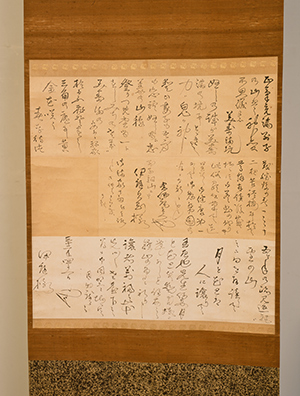Upon completing his service as general manager at Besshi, Teigo Iba composed this haiku on board a ship departing from the port of Niihama in 1899, inspired by a view of the Besshi mountains.
Having previously served as director of the Osaka Head Office, Iba set out from Osaka alone in 1894 to assume office as general manager at Besshi. He was appointed to address a series of problems: smoke damage caused by sulfur dioxide emitted from the Niihama Smelter, a consequent uprising of the local farmers, and labor unrest among the miners.
To solve the smoke damage problem, Iba displayed great resolve in executing a plan to relocate the smelter to Shisakajima, an island 20 kilometers offshore from Niihama. At the same time, he initiated a large-scale reforestation project to restore the denuded mountains. To deal with the farmers’ uprising and labor unrest, he frequently visited the mines and restoring relationships of trust with the farmers and workers by approaching them and engaging in dialogue. His five years at Besshi passed very quickly. Having achieved progress on various fronts, he returned to his post at the Osaka Head Office. Iba expressed the flood of emotions and thoughts that overcame him as he left Besshi in the words, “Looking back at the receding traces of five years: snow-covered mountains,” sent to his friend Yajiro Shinagawa, to whom he had confided his feelings of desperation when he took up his post at Besshi.
There is a second part to this haiku. Shinagawa, admiring Iba’s upper phrase, added his own lower phrase and presented the linked verse to Iba.
“Looking back at the receding traces of five years: snow-covered mountains. Moon and flowers bequeathed to another.”
Metaphorically speaking, Iba’s time at Besshi was the season of snow in that it was a time of hardship. But when he left, he bequeathed the season of the moon and flowers, motifs associated with spring, to his successor. The added verse expresses Shinagawa’s admiration of Iba’s selfless, gracious attitude.
This episode contains an important truth, namely, that a leader should shoulder responsibilities and grapple with difficulties and then, once the difficulties are overcome, step back and make way for the next generation.

 EN
EN